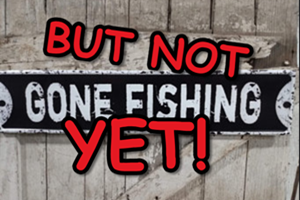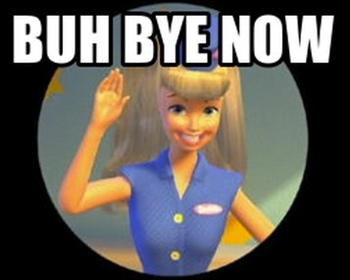Question
How can we screen headhunters? I know you’ve spoken at length about the difference between a real headhunter and those that are just casting a huge net and hoping to find someone to apply. Do you have any advice about what to look for, or what types of questions I can ask these headhunters off the bat to know whether they’re worth my time or not?
Nick’s Reply
 You already know the odds that a job solicitation is a real opportunity are tiny, and that it’s far more likely you’re dealing with someone who will waste your time — again! Most job solicitations are about as helpful as an e-mail pitching a tinnitus cure.
You already know the odds that a job solicitation is a real opportunity are tiny, and that it’s far more likely you’re dealing with someone who will waste your time — again! Most job solicitations are about as helpful as an e-mail pitching a tinnitus cure.
If the solicitation e-mail or text reads like boilerplate, delete it. If the caller is a fast-talking salesperson, hang up. It’s that simple.
“Uh, Nick, how does that help me?” you’re wondering. “I don’t want to miss out on any good opportunities.”
If you’re going to work with a headhunter, first you must qualify them — and that means you’ve got to test them before you can believe anything they say, and before you put yourself in their hands.
How to screen headhunters
If the caller sounds like an earnest business person politely asking for your help with an assignment to fill a job, you should keep talking — because there really are a few good headhunters out there. If you pay attention, you’ll find the best headhunters demonstrate high standards of conduct and reveal the same qualities they look for in candidates.
- They are easy to work with because they are straightforward. They speak clearly and directly. They are not secretive or cagey.
- They don’t waste time playing games or putting on airs. They make you feel special, rather than imply they are.
- If they start with an e-mail or text, they quickly follow up with a call or Zoom.
- They are not in a hurry. They take time to talk. They pay attention. They answer your questions.
- They are knowledgeable about their business, their client, the job they’re trying to fill and about you.
- Good headhunters don’t call on anyone blindly. They already know quite a bit about your background — not just what they found on LinkedIn — or they wouldn’t contact you.
- A good headhunter reveals integrity by being honest and trustworthy. They will do what they say — including returning your e-mails and calls.
- A good headhunter is conscientious. You’ll see this in the questions they ask. Rather than ask for your resume, the headhunter will learn about you by talking with you extensively.
- They will exhibit a sincere interest in your work and abilities, and in your interests and goals.
- They will give useful advice if you ask for it.
- Finally, a good headhunter is effective. If you’re a possible candidate for their client, you’ll get an interview in short order. If you’re not a fit, they’ll say so. They won’t lead you on.
Does that sound like any headhunter who has solicited you? I’m sure you’re shaking your head: What headhunter is going to do any of what’s in that list?
Right-O. Just a very few will. That’s why it’s so important to test or screen headhunters for those rare qualities immediately and every time. Most will fail, and that’s why you should test them all.
Try this test
When you’re done communicating (hopefully, talking) with a headhunter who contacted you, ask yourself, Could this headhunter write an adequate resume about me based strictly on our phone call?
I sometimes write a candidate’s resume just like that, after a phone call, and I provide it as a summary to my client. It’s a good test of my own grasp of a candidate’s credentials and value.
If a recruiter’s call is so cursory that you don’t think they could write your resume from it, that reveals an unskilled headhunter or an inadequate recruiting call. A headhunter who merely requests your resume or just asks you to fill out an application is no better than a job posting on the Internet. They’re going to waste your time. You don’t need them.
When you meet a good headhunter, you’ll know it from the characteristics listed above, and you’ll recognize someone with whom you’ll want to cultivate a long-term relationship.
Let’s get real: screen headhunters
You are likely shaking your head and maybe laughing at what I’ve said. “Nick, Nick, Nick! Let’s get real! The good headhunters you’re talking about don’t exist!”
A few good headhunter do exist — but they’re quite rare. So, why do most people who get bombarded with job solicitations respond to virtually any headhunter solicitation and waste time? (Loads of people fall for out and out job scams.)
The answer is easy, and embarrassing: It’s lazy, wishful thinking. People don’t want to do the hard work of finding the right job. They want Mommy — a headhunter — to serve it up to them. But they don’t bother to screen headhunters. So they comply with too many silly solicitations and complain when these turn out badly.
Let’s get real. There really are very few good headhunters out there. That’s no excuse to entertain the worst ones when you know better. Think of the hours you’ll save that you could better invest in actually finding the right job opportunity yourself!
(For more on this thorny topic, please check out How to Work With Headhunters… and how to make headhunters work for you.)
What percentage of headhunters (or recruiters) that contact you offer good, realistic job opportunities? How do the best ones behave? What behaviors tip you off to the worst?
: :




 I have experienced ageism and blew through it — several times. Pretty much solidly employed all my life, I usually changed jobs by my own choice.
I have experienced ageism and blew through it — several times. Pretty much solidly employed all my life, I usually changed jobs by my own choice.
 I am an executive at a large U.S. bank. I was approached by a headhunter and have had serious and positive discussions with a company he represents. We were at the next stage of me speaking with the CEO of the company. However, it turns out that the company is a business client of my bank and the CEO of the company is good friends with my boss. On account of this, the CEO is not comfortable meeting with me. The headhunter informed me that the CEO has asked me to resign or notify my boss of my intention to resign before he will meet with me and resume discussions. While they have indicated that they would then “fast track” the process immediately after that, it’s not a guaranteed offer. This seems absurd to me. The headhunter tells me this is not unusual at my high level, but I have never heard of such a practice. What are your thoughts?
I am an executive at a large U.S. bank. I was approached by a headhunter and have had serious and positive discussions with a company he represents. We were at the next stage of me speaking with the CEO of the company. However, it turns out that the company is a business client of my bank and the CEO of the company is good friends with my boss. On account of this, the CEO is not comfortable meeting with me. The headhunter informed me that the CEO has asked me to resign or notify my boss of my intention to resign before he will meet with me and resume discussions. While they have indicated that they would then “fast track” the process immediately after that, it’s not a guaranteed offer. This seems absurd to me. The headhunter tells me this is not unusual at my high level, but I have never heard of such a practice. What are your thoughts?
 Is it an ethical or typical practice that a recruiting agency submits more than one person for the same position? A headhunter contacted me about a management role in information security. I went in for the interview first, and while following up with the headhunter afterwards I did a bit of a brain dump about the way it went and what their personalities were like. As I was telling the recruiter my experience, I heard her clicking away at the keyboard and instantly I was thinking who is helping whom? So I asked, are you submitting someone else, and she said yes, the agency was, but she was not personally. The information I shared was used to help the next person they sent to interview after me.
Is it an ethical or typical practice that a recruiting agency submits more than one person for the same position? A headhunter contacted me about a management role in information security. I went in for the interview first, and while following up with the headhunter afterwards I did a bit of a brain dump about the way it went and what their personalities were like. As I was telling the recruiter my experience, I heard her clicking away at the keyboard and instantly I was thinking who is helping whom? So I asked, are you submitting someone else, and she said yes, the agency was, but she was not personally. The information I shared was used to help the next person they sent to interview after me. I am 70 years old and still actively working. I have been a consultant for an energy company since early this year, serving in an interim role. The company had a disastrous last year. I was brought in to help turn some of this around in the first quarter and “stand in” until a full-time person arrived. This was to have been a 4-5 month assignment; I am still here. I know I will not be brought on because of my age and I accept this.
I am 70 years old and still actively working. I have been a consultant for an energy company since early this year, serving in an interim role. The company had a disastrous last year. I was brought in to help turn some of this around in the first quarter and “stand in” until a full-time person arrived. This was to have been a 4-5 month assignment; I am still here. I know I will not be brought on because of my age and I accept this. My friends and I are successful IT (information technology) types and receive calls about positions from headhunters often. We are all experiencing the following:
My friends and I are successful IT (information technology) types and receive calls about positions from headhunters often. We are all experiencing the following:
 An employee quit without notice after five months. Her explanation was that she never wanted to stay at this job from the start. We paid a hefty agency fee for this person. She never signed any paperwork with the agency, and the contract stated that employment is “at will.”
An employee quit without notice after five months. Her explanation was that she never wanted to stay at this job from the start. We paid a hefty agency fee for this person. She never signed any paperwork with the agency, and the contract stated that employment is “at will.” A friend at a company I’m interested in working for referred me for a job. I have a phone interview scheduled with a “technical recruiter” later today. I asked if there was any special preparation I could do for the interview. I was told no, that we would be covering my previous experience and projects during the call.
A friend at a company I’m interested in working for referred me for a job. I have a phone interview scheduled with a “technical recruiter” later today. I asked if there was any special preparation I could do for the interview. I was told no, that we would be covering my previous experience and projects during the call. I’ve been in Human Resources 12 years and I have to say your article
I’ve been in Human Resources 12 years and I have to say your article  My suggestion to most businesses is that they can relieve their HR departments of recruiting, candidate selection and hiring functions without any significant loss. The HR function is Human Resources, not Human Recruiting. (See
My suggestion to most businesses is that they can relieve their HR departments of recruiting, candidate selection and hiring functions without any significant loss. The HR function is Human Resources, not Human Recruiting. (See